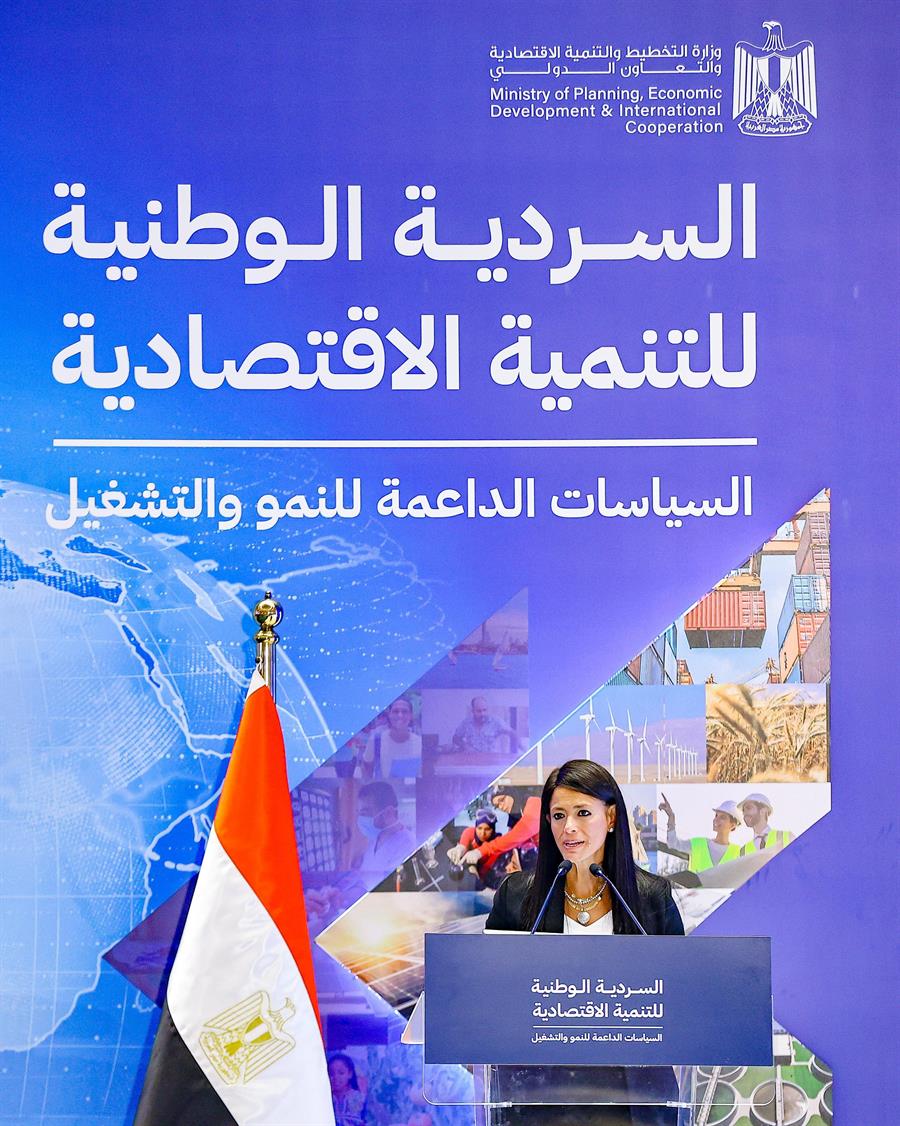Ministry of Planning, Economic Development and International Cooperation Reviews Key Pillars for Consolidating Macroeconomic Stability within “Egypt’s Narrative for Economic Development”

29 September 2025
H.E. Dr. Rania Al-Mashat:
Strengthening macroeconomic stability is a prerequisite for fostering an environment conducive to growth and investment.
More than 100 structural reforms are underway across state institutions to safeguard stability and stimulate investment and production.
Coordinated fiscal and monetary policies, efficient resource allocation, and governance of public investments are central to empowering the private sector.
Linking the sustainable development plan with the medium-term budget ensures resources are directed to national priorities while maximizing efficiency in public investment.
The Ministry of Planning, Economic Development and
International Cooperation has highlighted the main pillars of the first chapter
of “Egypt’s Narrative for Economic Development: Reforms for Growth, Jobs &
Resilience”, which positions macroeconomic stability as the foundation for
Egypt’s development efforts.
Economic stability serves as the platform for government
policy, enabling inclusive growth, boosting investor confidence, reducing
risks, creating jobs, and enhancing the competitiveness of the national
economy.
H.E. Dr. Rania Al-Mashat, Minister of Planning, Economic
Development and International Cooperation, underscored that achieving stability
requires disciplined fiscal and monetary policies that instill confidence,
along with prudent public finance management through expenditure governance,
broadening the tax base, and improving resource efficiency. Fiscal policy, she
stressed, must act as a driver of economic growth in partnership with the
private sector.
She further emphasized that governing public investments is
essential to ensure capital spending is directed toward developmental
priorities, freeing space for private investments, and maximizing the social
and economic returns of public investments.
Dr. Al-Mashat pointed out that the enactment of the State’s
General Planning Law No. 18 of 2022 and the Unified Public Finance Law No. 6 of
2022 marked a crucial step toward strengthening strategic planning, increasing
transparency, and linking development policies with the state budget.
She noted that the government is enhancing the integration
of the sustainable development plan with the medium-term budget, ensuring
resources align with national priorities. A new medium-term planning framework
has already been adopted, extending through FY 2028/2029, in coordination
between the Ministry of Planning and the Ministry of Finance.
The Minister also highlighted that over 100 structural
reform measures are being implemented by various state bodies, including the
Ministries of Planning, Finance, Manpower, and Social Solidarity, as well as
the Financial Regulatory Authority, covering fiscal policy, planning, and the
green transition.
These reforms include: Restructuring economic bodies, Publishing
a consolidated final government account, Issuing a procedural guide for
compiling general government data, Producing analytical reports on government
performance, Applying participatory budgeting in three governorates, Publishing
a medium-term fiscal strategy, Drafting a procedural manual for Program and
Performance Budgeting, Updating and publishing the medium-term debt management
strategy, Expanding statistical reporting on public debt, Enabling individual
investments in government debt instruments, Implementing a unified tax system
for SMEs and generalizing the e-tax platform, Issuing executive regulations for
the General Planning Law, Publishing the medium-term planning report and
procedural manual for the plan, Publishing semi-annual and annual reports on
public investments, Launching the National Employment Strategy, and Finalizing
the National Strategy for Integrating the Informal Sector.
The Ministry of Planning, Economic Development and
International Cooperation launched “Egypt’s Narrative for Economic Development:
Reforms for Growth, Jobs & Resilience” on September 7, under the patronage
and presence of H.E. Dr. Mostafa Madbouly, the Prime Minister.
The Narrative provides an integrated framework aligning the
government’s program with Egypt Vision 2030, while responding to regional and
global shifts. It sets out a transition toward an economic model anchored in
macroeconomic stability, focused on higher-productivity sectors with export
potential, leveraging completed infrastructure investments, and redefining the
state’s role in the economy to boost competitiveness and expand private sector
participation.
It also functions as both an economic reform program and a
strategic communication tool, articulating structural reforms that advance
growth, employment, investment, and private sector engagement, while
highlighting financing alternatives and sectoral opportunities.
The Ministry has also launched National Dialogue sessions as
part of the Narrative, bringing together ministers, development partners, the
private sector, and stakeholders. Complementing these discussions, the “Sharek”
campaign allows experts to review and comment on the document’s chapters via
the Ministry’s website.
Further details on “Egypt’s Narrative for Economic
Development: Reforms for Growth, Jobs & Resilience” and participation
opportunities are available at:









